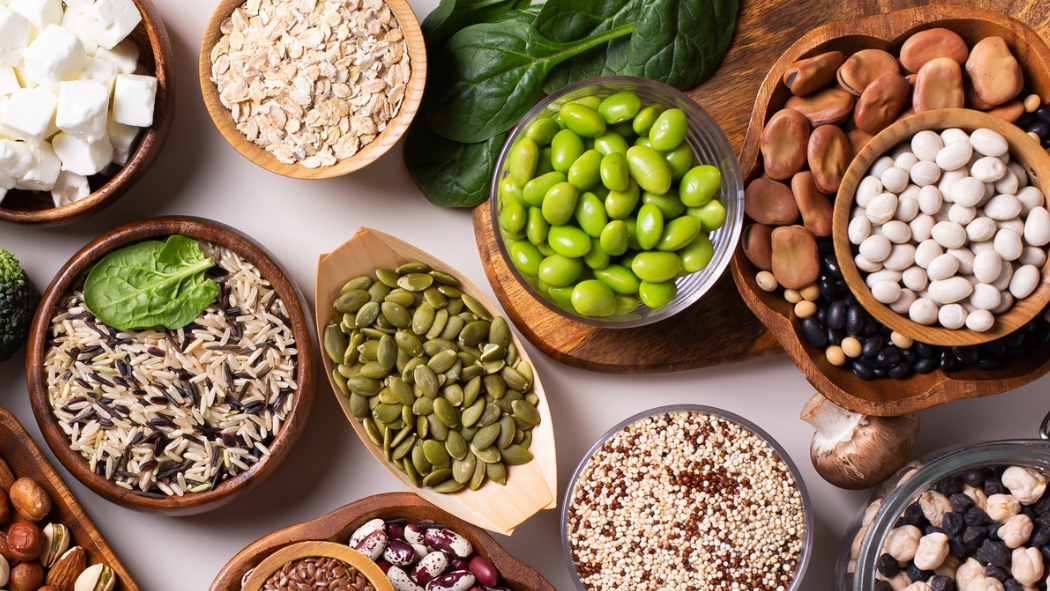There's no better time than now to focus on eating healthy and nourishing your body. Give these seven helpful tips a try, and enjoy your journey to healthy eating.

Quick Take
- Frozen fruits and vegetables are a budget-friendly source of essential nutrients.
- Make it a habit to stock your pantry with canned and dried beans and dried lentils.
- Oats and brown rice are budget friendly and rich in carbohydrates and fiber.
Eating right is one of the most important things we can do when it comes to our health. In fact, research finds that at least 80% of heart disease, stroke, and diabetes could be prevented if people ate better.
A healthy, balanced diet includes a variety of foods, including fruits, vegetables, whole grains, lean protein, healthy fats, and good sources of calcium, which can include low-fat dairy products and nondairy foods such as tofu and almonds.
When you're making a budget, however, it can be tempting to swap in unhealthy but lower-priced foods. In fact, one study found that a healthy diet can be up to four times more expensive than a diet that provides plenty of calories but lacks nutrition.
Fortunately, eating healthy can be as good for your wallet as it is for your body. Here are seven ways to serve up a well-balanced diet that contains the vitamins, minerals, and other nutrients and your family need while sticking to your budget.
1. Frozen fruits and vegetables can be a budget-friendly source of essential nutrients
Eating a variety of fruits and vegetables is a key to a healthy diet. In season, look for fresh, locally grown fruits and vegetables in stores and at farm stands. If you can’t find what you need at the price you want, reach into the grocery’s freezer cases. Research has found that frozen fruits and vegetables have just as many vitamins and other nutrients as their fresh counterparts. As a bonus, frozen fruits and vegetables won’t spoil — and to avoid freezer burn, wrap them well after you open the package. Frozen vegetables are great cooked by themselves or used in recipes, and frozen fruit is delicious as an ingredient in baked goods and smoothies.
2. Canned food can also be budget-friendly and healthy
Canned foods — including fruit, vegetables, beans, and fish — can be relatively inexpensive and have a long shelf life. However, make sure you read the label. Select fruits packed in water, not syrup, and check the salt content of vegetables and other savory foods.
3. Have a plan when you go food shopping
Make a list before you go to the store so you can avoid impulse buying — or at least reduce it. Planning your meals also allows you to pick recipes that have ingredients in common, helping you avoid waste and stretching your food dollar.
4. Grow your own herbs
Not everyone has the time or space for a fruit or vegetable garden, but you can grow many types of herbs in a pot on your windowsill, deck, or patio. For the price of a few bunches of herbs at the supermarket, you buy a starter plant and add flavor to your meals for months.
5. Stock up on beans and lentils
Make it a habit to stock your pantry with canned and dried beans and dried lentils. They are fairly inexpensive and have a long shelf life. Plus, they are easy ingredients to include in a protein-rich meal. Use them in a healthy side dish, stir up a hearty chili or another main dish, or add them to a salad for lunch.
6. Oats and brown rice can be a filling option
Oats and brown rice are budget friendly and rich in carbohydrates and fiber. Buying them in bulk can help save money. Oats and brown rice help lower blood sugar and cholesterol, and some experts believe that they can protect you from heart disease.
7. Consider dried fruits as part of your meal or for snacking
Dried fruits can seem pricey, but a little goes a long way. For example, 1 pound of raisins is equivalent in calories and nutrients to about 4½ pounds of grapes. Research suggests that drying can increase the antioxidants in fruit, and when stored properly, dried fruits can keep in your pantry for a long time. You can stir dried fruits into oatmeal or yogurt, use them to sweeten baked goods, or enjoy out of hand when you’re in the mood for a sweet snack. Dried fruits can also help promote digestive health.
There's no better time than now to focus on eating healthy and nourishing your body. Give these helpful tips a try, and enjoy your journey to healthy eating.